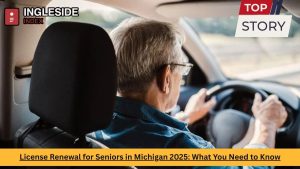Pennsylvania has long been recognized for its proactive approach to supporting older adults, particularly those aged 50 and over. With nearly 20% of the state’s population falling into the senior category, the demand for robust financial, healthcare, housing, and nutritional support continues to grow. Whether living in urban centers like Philadelphia and Pittsburgh or smaller towns like Erie, Allentown, and Lancaster, seniors in Pennsylvania have access to a wealth of free government money programs designed to ease financial burdens and promote independent living.
This guide provides an in-depth overview of Pennsylvania’s key financial assistance programs for residents over 50 — including city-specific services, application processes, and little-known opportunities — to help older Pennsylvanians make the most of the benefits available to them.
Pennsylvania’s Aging Population: A Statewide View
The state of Pennsylvania is among the oldest in the country, with over 3.4 million residents aged 60 or older. This demographic shift has been driven by increasing longevity, post-retirement migration trends, and a desire among many to stay close to family and community.
While rural counties are seeing an uptick in aging populations, urban regions like Philadelphia, Pittsburgh, Lancaster, and Allentown also report growing numbers of seniors. These areas are better equipped with healthcare infrastructure, community programs, and transportation services, making them attractive for retirees and older adults seeking support.
Why Free Government Programs Matter for Those Over 50
Government money programs are not just for those at poverty levels. Many seniors living on fixed incomes, managing chronic conditions, or supporting dependents benefit immensely from state and federal support. For Pennsylvanians over 50, these programs are lifelines that help with:
- Reducing the cost of prescription drugs
- Ensuring stable, affordable housing
- Accessing in-home health care
- Receiving meals and nutrition assistance
- Staying socially engaged and physically active
- Offsetting property taxes and utility costs
These services promote a safer, healthier, and more dignified lifestyle, especially for those aging in place or transitioning into retirement.
Overview of Major Free Government Money Programs in Pennsylvania
OPTIONS Program
The OPTIONS program is designed for individuals aged 60 and over and offers non-medical services such as home-delivered meals, personal care, and transportation. It supports seniors in remaining in their homes longer without requiring full-time institutional care.
Home and Community-Based Services (HCBS)
HCBS waiver programs under Medicaid provide personalized services to seniors at risk of nursing home placement. Key offerings include:
- In-home assistance
- Adult day care
- Medical transportation
- Respite care for caregivers
Property Tax and Rent Rebate Program
Seniors aged 65 or older, or individuals over 50 who are widowed or disabled, may qualify for this rebate based on income and housing status. Many residents in areas like Norristown, Pittsburgh, and Lancaster claim this annually, helping to offset property taxes or rent.
PACE and PACENET
These pharmaceutical assistance programs help seniors reduce their out-of-pocket medication costs. PACE serves lower-income seniors, while PACENET helps those who fall just above PACE’s income limit. Both programs are widely accessible across Pennsylvania’s cities and towns.
Caregiver Support Program
Families providing care for elderly or disabled relatives can receive reimbursement for expenses such as supplies, training, and short-term relief care. This program is vital for those managing caregiving responsibilities at home.
Medicare Savings Program
This program helps seniors with limited income pay Medicare Part B premiums, copays, and deductibles. It’s available to individuals just above the Medicaid threshold and dramatically reduces healthcare expenses.
Weatherization and Home Repair Assistance
Seniors can receive grants to repair roofing, windows, and other structural issues that compromise health and safety. Energy efficiency upgrades are also available to reduce utility bills.
Meals on Wheels and Senior Nutrition
Meal delivery programs are active across both urban and rural Pennsylvania, with fresh, balanced meals provided to those unable to cook for themselves. Community centers also host congregate meals and nutrition education classes.
City-by-City Breakdown of Resources for Seniors
Philadelphia
Philadelphia leads the state in the number of seniors benefiting from government programs. The city has a dense network of services, from free transportation to energy assistance and home health services. Programs are particularly active in South Philadelphia, Center City, and Germantown.
Pittsburgh
Pittsburgh is praised for its senior living affordability and active aging programs. Seniors in areas like Squirrel Hill and Brookline benefit from rental assistance, prescription discounts, and robust legal aid programs for elder rights.
Lancaster
Lancaster is consistently ranked as one of the top cities in the U.S. for retirees. The city offers job training programs for seniors returning to the workforce, housing grants, and ongoing health education through local community centers.
Allentown
Allentown features city-backed transportation services for medical visits, as well as financial literacy programs. Seniors in Downtown Allentown benefit from home modification grants and energy assistance programs to maintain safe, livable conditions.
Harrisburg
As the capital, Harrisburg offers extensive public resources for seniors. Veterans, disabled residents, and those in public housing receive prioritized access to financial aid programs. The city also operates large-scale seasonal initiatives for heating and cooling support.
Scranton and Erie
Both Scranton and Erie are known for their close partnerships with nonprofits. Free tax preparation services, utility bill support, and weatherization programs are heavily promoted. Community action agencies here provide direct help with applications and follow-ups.
Trends and Demographics
- Over 3.4 million Pennsylvanians are aged 60+, accounting for a major portion of the state population.
- Social Security recipients number over 2.9 million across Pennsylvania, particularly dense in Allegheny, Montgomery, and Bucks counties.
- Lancaster’s aging population has exceeded 44,000 individuals aged 65 and over — growing steadily due to its retiree-friendly reputation.
How to Apply for These Programs
Accessing these resources doesn’t have to be difficult. Most counties in Pennsylvania operate an Area Agency on Aging, a vital hub for application support.
Steps for Enrollment
- Determine Eligibility: Each program has age, income, or residency criteria. Always check specifics before applying.
- Prepare Documents: Commonly needed are income statements, ID, residency proof, and health insurance information.
- Submit Applications: Applications can be submitted online, via phone, or in-person through local senior centers.
- Attend Workshops: Many cities hold monthly events to help seniors complete paperwork and learn about additional opportunities.
Community-based help is available in nearly every county, including mobile units and outreach for those in remote areas.
Beyond Financial Aid: Holistic Services for Seniors
Support goes well beyond money. Seniors can also benefit from:
- Health Insurance Counseling: Free programs like APPRISE (SHIP) help explain Medicare options.
- Community Center Access: Seniors enjoy free yoga, crafts, tech classes, and lectures.
- Elder Law Assistance: Guidance on wills, fraud protection, and power of attorney is available at no cost.
- Digital Literacy: Technology workshops help older adults navigate telehealth and online government portals.
These services aim to reduce isolation, improve wellness, and empower independence.
Hidden and Underused Resources
Despite the availability of numerous programs, many go underutilized due to misinformation or lack of awareness. Some of the most overlooked opportunities include:
- Winter utility subsidies
- Disaster assistance funds
- Seasonal tax clinics for older adults
- Senior job placement programs
Seniors are encouraged to visit their local Area Agency on Aging or sign up for municipal newsletters to receive alerts on new or seasonal programs.
Debunking Common Myths
- Only the very poor qualify – Many moderate-income seniors are eligible for at least one benefit program.
- The process is too complex – With community help and digital tools, applying is easier than ever.
- Only cities get benefits – Rural areas also have aging offices and traveling service teams to provide support.
Building a More Inclusive Future
State and local governments are taking steps to improve access and equity by:
- Expanding outreach to non-English speaking seniors
- Increasing mobile services in rural counties
- Launching digital access programs for tech-challenged older adults
- Partnering with religious groups and local hospitals for application drives
This evolving strategy ensures that every older Pennsylvanian — regardless of location — can access the benefits they deserve.
Looking Ahead
Pennsylvania’s population is aging rapidly, but with thoughtful programs and strong local networks, the state is well-positioned to support seniors through this demographic transition. Whether living in urban, suburban, or rural environments, Pennsylvanians over 50 have the opportunity to live with greater comfort, security, and independence — thanks to a rich array of free government programs.
Conclusion
Free government money programs in Pennsylvania are not just safety nets; they’re tools for empowerment. Whether you’re newly 50 or well into retirement, the state offers ways to reduce costs, stay healthy, and remain connected to your community.
Reach out to your Area Agency on Aging, ask your local community center about available services, and take that first step toward a more secure and enriched life.




